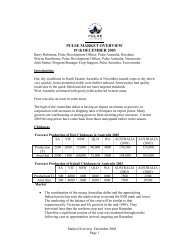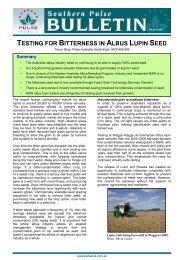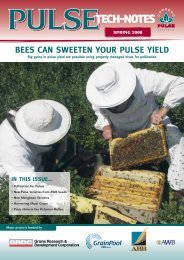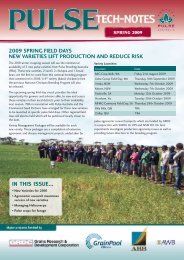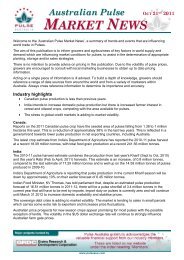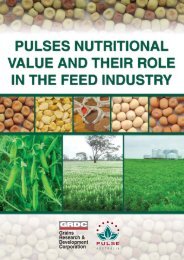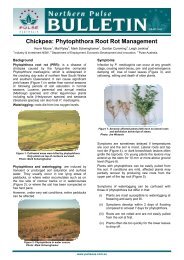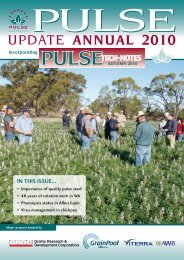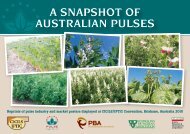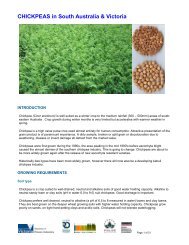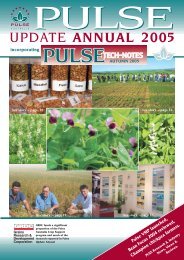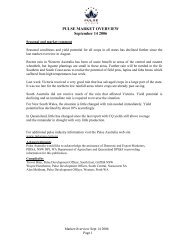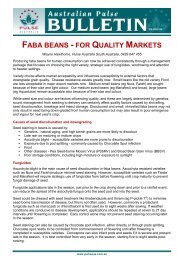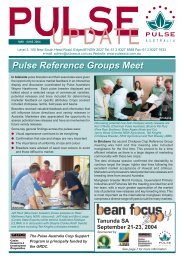Australian Grain Industry Code of Practice - Pulse Australia
Australian Grain Industry Code of Practice - Pulse Australia
Australian Grain Industry Code of Practice - Pulse Australia
Create successful ePaper yourself
Turn your PDF publications into a flip-book with our unique Google optimized e-Paper software.
5.2 Other <strong>Industry</strong> <strong>Code</strong>s and<br />
Accreditation Processes<br />
The grain industry has a range <strong>of</strong> supporting codes, quality assurance<br />
systems and accreditation processes that support product quality,<br />
integrity and industry practices.<br />
<strong>Industry</strong> based codes include:<br />
AOF – <strong>Code</strong> <strong>of</strong> <strong>Practice</strong> for the Bulk Transport <strong>of</strong> Vegetable Oils<br />
by Road and Rail & AOF – <strong>Code</strong> <strong>of</strong> <strong>Practice</strong> for the Bulk Transport<br />
<strong>of</strong> Vegetable Oilseeds, Meals and Hulls by Road and Rail<br />
These <strong>Code</strong>s <strong>of</strong> <strong>Practice</strong> are intended to encourage good and safe<br />
practices as well as ensure the cleanliness and safety <strong>of</strong> transport for<br />
goods, including imports, which are, or may be, intended either for<br />
human consumption after processing or which are intended to enter<br />
the food chain either for direct feeding to livestock or for incorporation<br />
into animal feeding stuffs. These codes cover transport <strong>of</strong> crops (e.g.<br />
grain, pulses, oilseeds), vegetable protein meals and hulls and edible<br />
liquid products (oils).<br />
AOF – <strong>Code</strong> <strong>of</strong> <strong>Practice</strong> for the Cleaning Of Containers List<br />
<strong>of</strong> Prohibited Immediate Prior Loads<br />
This <strong>Code</strong> is designed to ensure all supply chain participants are<br />
aware <strong>of</strong> prohibited immediate prior loads, and <strong>of</strong> the cleaning<br />
operations that need to be undertaken before a Certificate <strong>of</strong><br />
Cleanliness can be issued for acceptable prior loads.<br />
AOF Guidelines for Use <strong>of</strong> Structural Treatment<br />
Chemicals on Canola<br />
These Guidelines provide information on industry practices to ensure legal<br />
and market tolerances for chemicals on canola can be met. They address<br />
chemical treatments that are applied to grain or used within a storage/<br />
handling facility to prevent/treat an insect infestation and address the<br />
need to minimise the transfer <strong>of</strong> these chemicals onto canola.<br />
ASF – National <strong>Code</strong> <strong>of</strong> <strong>Practice</strong> for Seed Labelling<br />
and Marketing<br />
This <strong>Code</strong> strives to ensure consumers are provided with consistent<br />
and accurate information enabling them to make informed decisions<br />
about the suitability <strong>of</strong> seed for sowing.<br />
ASF – National <strong>Code</strong> <strong>of</strong> <strong>Practice</strong> for the Use <strong>of</strong> Seed Treatments<br />
This <strong>Code</strong> aims to ensure all treated seed for sowing sold under the ASF<br />
logo has been treated safely, accurately and efficiently in accordance<br />
with current regulatory and industry best practice methods.<br />
GTA / Livestock & Bulk Carriers Association Bulk Freight<br />
Goods <strong>Code</strong> <strong>of</strong> <strong>Practice</strong><br />
The <strong>Grain</strong> Transport <strong>Code</strong> <strong>of</strong> <strong>Practice</strong> is a joint initiative between GTA<br />
and the Livestock and Bulk Carriers Association (LBCA). GTA and LBCA<br />
<strong><strong>Australia</strong>n</strong> <strong>Grain</strong> <strong>Industry</strong> <strong>Code</strong> <strong>of</strong> Conduct 33



